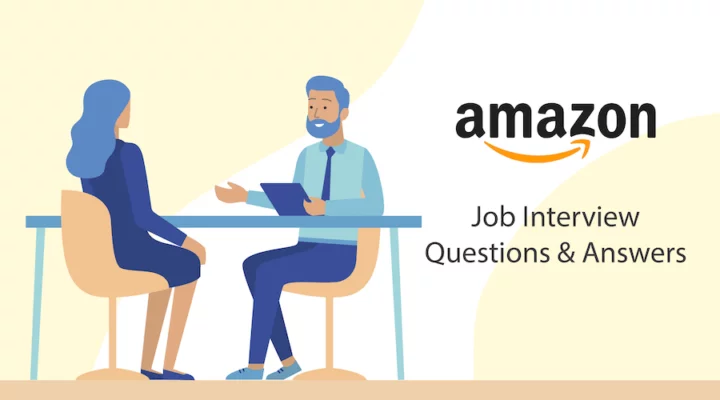If you have ever gone through just one interview in your professional life, you definitely have found yourself face to face with the question that starts with “tell me about a time” right?
Landing your dream job often hinges on a successful interview session. But beyond the typical questions about your education and experience, there’s one inquiry that can leave even the most prepared candidate feeling a flicker of nervousness: “Tell me about a time…”.
This type of question is very commonly asked in interviews, specifically during big tech/services companies like Amazon and Google’s Interviews, even though sometimes they do come as a surprise!
So, just because they might catch you off guard, doesn’t mean preparing for them is not possible.
This seemingly simple question holds immense power for employers. It’s their window into your past experiences, problem-solving skills, and ability to navigate challenges. Acing this question can be the difference between making a lasting impression and getting lost in the crowd.
The good news? There’s a strategy to mastering the “Tell me about a time…” question. This comprehensive guide equips you with the tools and techniques you need to craft compelling responses that showcase your strengths and value proposition.
We’ll delve into the STAR method – a powerful framework for structuring impactful responses. We’ll explore tips for brainstorming relevant experiences from your past and translate them into powerful narratives using the STAR method. Additionally, we’ll offer valuable advice on tailoring your responses to specific job roles and leaving a lasting positive impression on interviewers.
So, ditch the interview jitters and prepare to conquer the “Tell me about a time…” question with confidence. This guide is your roadmap to interview success and landing your dream job!
If you would like a more detailed article about the STAR method and common STAR questions, then head to our Star Method Interview Questions article.
For candidates who are looking for Amazon-specific information, we also have an article about the Amazon Leadership Principles Interview Questions, all you have to do is go through it and study those answers a bit to get what the structure looks like.
Table of Contents
Decoding the “Tell me About a Time” Question
As we mentioned, the “Tell me about a time…” question is a staple in most interview sessions, and for good reason. While it might seem generic on the surface, it holds immense value for employers seeking to assess your capabilities beyond your resume. Understanding the purpose behind this question and its various forms can empower you to craft compelling responses that showcase your skills and leave a lasting impression.
Why “Tell me about a Time” type of Behavioral Interview Questions Matter
Traditional interview questions often focus on your educational background and work experience listed on your resume. However, behavioral interview questions like “Tell me about a time…” delve deeper. Employers want to understand how you’ve applied your skills and knowledge in real-world situations.
These questions provide valuable insights into your:
Problem-solving abilities: How do you approach challenges and identify effective solutions?
Decision-making skills: Can you make sound judgments and take initiative in complex situations?Communication skills: How effectively do you articulate your thoughts and ideas, both verbally and in writing?
Teamwork and collaboration: Do you function well within a team environment? Can you collaborate effectively with others?
Leadership qualities: Do you possess the ability to motivate and inspire others?
By asking “Tell me about a time…”, employers can assess these critical qualities through your past experiences. They’re essentially asking you to tell a story – a story that highlights your strengths, approach to challenges, and the positive outcomes you’ve achieved.
Variations of “Tell me About a Time”
While “Tell me about a time…” is a common phrasing, this type of behavioral interview question can take different forms. Here are some variations you might encounter:
“Describe a situation where…”
“Give an example of…”
“Tell me about a challenge you faced and how you overcame it.”
“How did you handle a difficult situation with a colleague or client?”
Regardless of the specific wording, the underlying objective remains the same – to understand your past behavior and predict how you might react and perform in similar situations within the role you’re applying for.
By recognizing these variations and understanding the employer’s intent, you can approach these questions with confidence and craft responses that effectively showcase your value as a potential employee.
The STAR Method: Crafting a Powerful Response
The “Tell me about a time…” question might seem open-ended, but crafting a compelling response requires a structured approach. Here’s where the STAR method comes in. STAR stands for Situation, Task, Action, Result, and it provides a framework for building clear, concise, and impactful responses that effectively showcase your skills and experiences.
For an in depth-guide about how to utilize this method in your interviews, you may want to check out our the STAR Interview Technique article.
Preparing for the “Tell me About a Time” Question
The “Tell me about a time…” question might send shivers down some candidates’ spines, but with proper preparation, you can approach it with confidence. This section equips you with valuable tips to brainstorm relevant past experiences and formulate impactful responses using the STAR method.
Brainstorming Relevant Experiences
Review the Job Description: The job description serves as your roadmap. Carefully analyze the skills and experience listed – these are the qualities the employer seeks in an ideal candidate.
Think Outside the Box: Don’t limit yourself to work experiences. Consider volunteer work, academic projects, or even personal challenges that demonstrate the desired skills.
Focus on Categories: Break down the skills and experience requirements into categories like:
- Problem-solving and Decision-Making: Describe a time you identified a problem, analyzed possible solutions, and made a well-informed decision.
- Communication and Collaboration: Share an experience where you effectively communicated ideas, collaborated with a team to achieve a goal, or managed a challenging client interaction.
- Leadership and Initiative: Did you take charge in a situation? Motivate a team? Describe a situation where you demonstrated leadership qualities or initiative.
- Technical Skills: For technical roles, highlight projects where you utilized specific software, tools, or programming languages relevant to the position.
Reflecting on Your Actions
Once you’ve identified a relevant experience, take time to reflect on the specifics:
What were your specific actions? Go beyond simply stating your role; delve into the specific steps you took to address the situation or fulfill the task.
What decisions did you make? Highlight the choices you made and the thought process behind them. This demonstrates your critical thinking and problem-solving abilities.
What skills did you utilize? Identify the key skills you used throughout the experience – communication, leadership, analytical thinking, etc.
What was the outcome? Reflect on the positive result of your actions. Did you solve a problem? Improve a process? Increase efficiency? Quantify the impact whenever possible.
By thoroughly reflecting on your past experiences through this lens, you’ll be well-equipped to craft compelling STAR-method based responses that effectively showcase your value proposition.
“Tell Me About a Time”: Reflecting on Past Experiences

During any interview, you will be asked broad questions that take you back to the past.
That is a very crucial part of any interview, and if you had any experience mentioned on your resume, you will most certainly be asked about it.
When you talk about situations that unfolded in the past, you are basically walking your interviewer or potential employer into how your mind functions at work, and how you handle situations.
You also show them indirectly whether you would be a good fit for the existing team they have or not with these tricky questions.
We don’t mean to stress you out, but to some extent, the way you answer these questions can either land you your dream job or keep you on the hunt for one.
No pressure though!
Their questions on the past could vary. Perhaps they would want to know more about how well you manage deadlines, about your experience working under pressure or solving a problem. They might even ask about previous experiences at work, like getting along with the team from your old job, etc.
Those behavioral questions are not necessarily related to work, but they do show how you blend in with others if you are easy-going and flexible.
Also, when it comes to your communication skills and leadership skills. A lot of people would claim to have them don’t you think? And those are not something your employer can measure, but, they can ask these types of questions.
Some studies have actually shown that past experiences can predict the future, so your potential employers probably do recognize that already.
Make sure you are honest and give an effective answer when answering these questions.
If they catch you off guard, which is very expected, take a few seconds to collect your thoughts and formulate your answer. Your interviewer would appreciate that more than giving them a rushed answer that is scattered all over the place.
“Tell Me About a Time”: The Positive and The Negative
The tell me about a time interview questions is not always going to be about something positive. For example, Amazon is considered a very important, sophisticated company, so they will naturally try to challenge you when asking these questions to make sure they only hire the best of the best. It goes similar in other companies like Google, Microsoft, Apple and Meta (Facebook)
It is safe to say that nobody’s career had only positive outcomes to offer.
However, you have to understand what is considered positive and what is considered negative.
For example: “tell me about a time you failed to keep up with a certain deadline” is considered negative.
The context of negativity here is not directed to you because you “failed”, but because failing is natural and they simply would want to know more about how you handle such situations.
While this question: “tell me about a time when you had a positive, constructive interaction with your team” is considered positive.
The negative question might make you nervous at first, but you have to be honest and not stressed because your interviewer already knows that failure is bound to happen to everyone at some point in time.
Sometimes they are not trying to find out about your failure as much as they are trying to see your integrity, calmness, and honesty in action.
You can use answering such questions as an opportunity to show your growth both as an individual and as a professional, you can say the way you fixed this and kept it from happening again, or you can say what you did you ensure delivering quality work despite missing the deadline set for you.
This allows you to step into your humanness and show your potential employer that everything matters to you regardless of how negative or positive it is deemed because both of these things teach you something valuable that allows you to enhance your experience.
It is all about the mindset, so don’t look at these questions from a negative perspective, they are simply a chance for you to tell a story about yourself and show them your organizational skills.
It is basically your time to shine!
If you follow these tips, you are going to land your dream job at a much desired big company very soon!
“Tell Me About a Time”: The Most Common Questions

At this point, you are probably wondering what those questions might be. As you know they are mostly behavioral interview questions.
Our team has collected various questions that you will see in this section so you can start training for your interview at Amazon or similar companies. So here they are;
Question #1
Question: Tell me a time when you had to make a difficult decision.
Answer: I was working on a project for my previous employer as a project manager and we had a tight deadline for running a new ad campaign.
I had to make a decision whether to cut corners and risk the quality of the project or take more time and ensure that the project was done correctly.
I decided to take more time and ensure that the project was done correctly, even though it meant missing our deadline.
After this risky decision, we ended up with a very successful sales campaign which my decision paid off as we were able to increase sales by %20.
Question #2
Question: Tell me about a time when you had to deal with an angry customer.
Answer: In my previous job, I was working as a customer service representative and I had to deal with an angry customer who was not satisfied with our product.
My task was to listen to the customer and understand their issue, then find a solution that would satisfy them.
I listened to the customer carefully and realized that the issue was not with the product but with the delivery process. I then offered them a full refund and a free replacement of the product, which they accepted.
As a result, the customer was satisfied and I was able to maintain a good relationship with them. Also, the customer gave me a positive review which helped to improve our customer service reputation.
Question #3
Question: Tell me about a time when you used data to influence/persuade people.
Answer: In my previous job, I was working as a marketing analyst and I had to use data to influence the decision-making process.
I was tasked to gather data from various sources and analyzed it to identify trends and patterns that could be used to inform our decisions.
I then presented my findings in a clear and concise way so that everyone could understand the implications of the data.
My presentation was successful and I was able to persuade the team to make decisions based on the data. As a result, our marketing campaigns were more successful and we were able to decrease our checkout abandonment rate by %20.
Question #4
Question: Tell me about a time when you influenced engineering to build a particular feature.
Answer: In my previous job, I was working as a product manager and I had to influence engineering to build a particular feature.
I identified the need for this feature by talking to customers and understanding their needs.
I then worked with the engineering team to develop a prototype of the feature. After that, I presented the prototype to stakeholders and convinced them of its value.
Finally, I worked with the engineering team to ensure that the feature was built correctly and on time. As a result, we were able to launch the feature successfully and it had a positive impact on our product.
Question #5
Question: Tell me about a time when you had a conflict with a colleague. How did you solve your disagreement?
Answer: In my previous job, I was working as a sales specialist and I had a conflict with a colleague over how to approach a particular customer.
My colleague wanted to take an aggressive approach while I wanted to take a more subtle approach.
We discussed our disagreement and I was able to explain my point of view in a calm and rational manner. After that, we were able to come up with a compromise that satisfied both of us.
We then implemented the compromise and it worked out well for the customer. As a result, our disagreement was resolved and we were able to maintain a good working relationship.
Question #6
Question: Tell me a time that you were halfway to meeting your goal but had to pivot because you found the goal might not be right.
Answer: In my previous job, I was working on a project to increase customer satisfaction. I had set a goal of increasing customer satisfaction by 10% within six months.
After four months, I achieved only 5% of the goal and realized that the goal might not be achievable in the given timeframe.
I then decided to pivot and focus on improving customer service instead. I worked with the customer service team to identify areas of improvement and implemented changes accordingly.
As a result, we were able to improve customer satisfaction by 15% within six months.
Question #7
Question: Tell me about a time when you were forced to change the way you work.
Answer: In my previous job, I was working on a project that required me to use a particular software.
However, halfway through the project, the software was no longer supported and I had to find an alternative.
I researched different options and identified a suitable alternative. I then worked with the team to transition from the old software to the new one.
I also had to adjust my workflow accordingly and learn how to use the new software. As a result, we were able to complete the project on time and with minimal disruption.
Question #8
Question: Tell me about a time you had an idea that your team was skeptical about. How did you convince your team that you were right?
Answer: While I was working for a big clothing brand, I had an idea to launch a new product line.
My team was skeptical about the idea as they thought it would be too risky and that it wouldn’t be profitable.
I then presented my idea in detail and showed them how it could benefit the company. I also provided data to back up my claims and showed them how the risks could be mitigated.
After that, I was able to convince my team that the idea was worth pursuing and they eventually agreed to launch the product line and that product line was a success.
Question #9
Question: Tell me about a time when you had a mission or goal you didn’t think was achievable. What was it and how did you help your team try to achieve it?
Answer: In my previous job, I was managing the customer care team and our goal was to reduce customer complaints.
I was tasked with increasing customer satisfaction by 20% within six months which I thought was impossible.
I then worked with the team to identify areas of improvement and set achievable goals. We also implemented a customer feedback system and improved our response time.
As a result, we were able to reduce customer complaints by 15% within six months which was a great success.
Question #2
Question: Tell me about a time when you received criticism from a manager that you didn’t agree with. What did you do?
Answer: In my previous job, I was working on a marketing project and my manager gave me some feedback that I didn’t agree with.
At first, I was not happy and wanted to argue my point. However, I decided to take a step back and listen to what he had to say.
After listening to his feedback, I realized that he had valid points and that his criticism could help me improve the project.
I then worked with him to incorporate his feedback into the project and it ended up being a success.
Do you have an interview with Amazon?
Pro Tip
Make sure to check out our top-selling Amazon Interview Guide which comes with a full refund guarantee in case you fail your interviews.

Tell Me About a Time Interview Questions: Conclusion
So we covered ten Tell Me About a Time interview questions and answers. These types of questions are designed to assess how you handle different situations and how you respond to criticism.
It is important to be honest and provide specific examples when answering these questions. By doing so, you can demonstrate your problem-solving skills and show that you are capable of adapting to new challenges.
So, using tell me about a time interview questions is a great way of assessing the quality, communication skills, actions under stressful situations, and characteristics of potential employees.
Not only do they provide insight into an individual’s experience, but they also give employers the chance to get to know them better.
To see some behavioral question & answers examples, you may read our 33 Behavioral Questions post as well.
We hope you enjoyed reading this article and that it helps you prepare for your next job interview!


